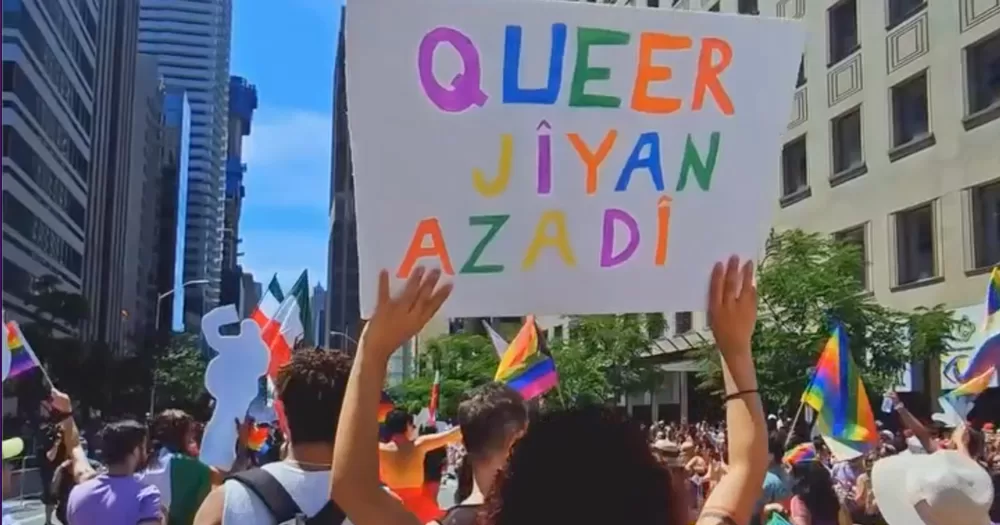In a country where internet freedom remains highly restricted and government surveillance is used to monitor and control its citizens – queer campaigners fight against censorship and oppression in Iran.
On September 13, 2022, Jina Mahsa Amini, a 22-year-old Kurdish-Iranian woman, was arrested in Tehran by the Islamic Republic of Iran’s “morality police” for allegedly not wearing her hijab properly and died three days later while in custody. Eyewitnesses who were detained with Amini reportedly saw her being severely beaten by the officers in charge, a claim which authorities have denied.
Amini’s death sparked an uprising and the beginning of the “Women, Life, Freedom” protests in Iran, with solidarity rallies around the world. However, Western media outlets were slow to cover the movement.
In response to this, the Iranian Diaspora Collective (IDC) was founded by Mandy Ansari, Farnaz Dadashi, Moj Mahdara, Roya Rastegar and Nicolette Mason – a queer-led group of first and second-generation Iranians who are living outside of the country.
The IDC’s aim is to be a voice for what’s going on inside Iran and to advocate for all marginalised groups, including women, ethnic/religious minorities and the queer community.
The IDC recently launched the ‘Connectivity is a Human Right: Keep Iran Online’ initiative to fight against internet censorship by the Islamic Republic of Iran.
View this post on Instagram
Yasmin Green, who fled Iran with her parents at three years old, is now the CEO of Jigsaw at Google – a unit that develops technology to solve global security issues. Green has teamed up with the IDC to secure virtual private network (VPN) access in Iran, protecting internet freedom and the flow of information between citizens and journalists.
VPNs are designed to be really good at getting around restricted internet access. They work by connecting people to a distant server in a country without strict internet rules. Then, their internet traffic goes through that server, making it look like they’re browsing from that country. This helps them to avoid online censorship and keeps activity private from local internet providers.
VPNs use a process called tunnelling to secure the communication between the device and the distant server, so others can’t see what people are doing online, even though they can tell they’re using a VPN.
In an interview with POLITICO, Green says, “Iran is a great case in point that the internet can really be the oxygen of a resistance movement.
“You realise wherever the population is tech savvy, the government is tech savvy, too. The Islamic Republic of Iran is so sophisticated in their brazen use of technology to surveil and to censor, to block and to persecute people.”
According to a report released by 6Rang, an Iranian lesbian and transgender network, queer protesters were highly targeted and harassed by police during the 2022-23 protests in Iran.
Under the country’s Islamic Penal Code, a person found to be in a consensual same-sex relationship can be sentenced to the death penalty, with this punishment also applying to children under the age of 18 (the age of criminal responsibility in Iran is 15 years for boys and 9 years for girls).
The IDC has harnessed social media to advocate for the queer community in Iran, since many activists and journalists have been silenced by censorship and persecution.
“I think that hope and a bit of optimism is very much coming from the youth of Iran, ethnic minorities in Iran; this is a very intersectional movement. It is a women’s movement, but it’s also a movement for ethnic minorities and religious minorities and sexual minorities”, says IDC co-founder Nicolette Mason in an interview with British Vogue.
© 2023 GCN (Gay Community News). All rights reserved.
Support GCN
GCN is a free, vital resource for Ireland’s LGBTQ+ community since 1988.
GCN is a trading name of National LGBT Federation CLG, a registered charity - Charity Number: 20034580.
GCN relies on the generous support of the community and allies to sustain the crucial work that we do. Producing GCN is costly, and, in an industry which has been hugely impacted by rising costs, we need your support to help sustain and grow this vital resource.
Supporting GCN for as little as €1.99 per month will help us continue our work as Ireland’s free, independent LGBTQ+ media.
